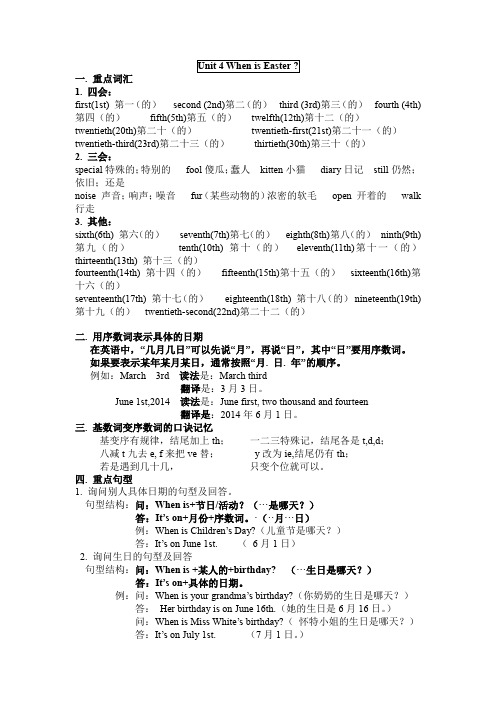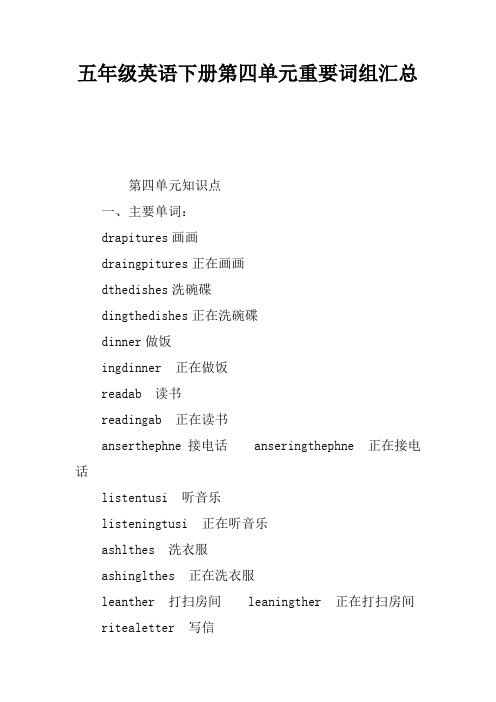五年级英语下册第四单元重要词组汇总
- 格式:docx
- 大小:15.74 KB
- 文档页数:3

五年级下册英语第四单元知识要点一、单词部分1. 本单元有好多有趣的单词呢。
像“first(第一)”,它的发音是[fɜːst],是序数词,和基数词“one”相对应。
可以造句为:I am the first one to come to school.(我是第一个到学校的。
)它的近义词可以是“primary”,不过“primary”更侧重于表示“首要的,初级的”这种意思。
反义词嘛,从顺序上来说就是“last(最后的)”啦。
2. “second(第二)”,发音是[ˈsekənd],同样是序数词,对应基数词“two”。
例句:He gets the second prize in the race.(他在比赛中获得了第二名。
)近义词可以是“next”,表示下一个的意思,反义词也是“last”。
3. 还有“special(特别的)”这个单词,读音是[ˈspeʃl]。
例如:This is a special day for me.(这对我来说是特别的一天。
)它的近义词是“particular”,反义词是“ordinary(普通的)”。
二、短语1. “sports meet(运动会)”,这是个很常用的短语。
在学校里,大家最期待的就是这个啦。
可以说“We have a sports meet every year.(我们每年都有一个运动会。
)”2. “Easter party(复活节派对)”,如果要描述这个派对很有趣,可以说“The Easter party is really exciting.(复活节派对真的很令人兴奋。
)”三、句型1. “When is the sports meet?(运动会是什么时候?)”这是一个询问时间的句型。
回答可以是“It's on April 4th.(在四月四日。
)”2. “We have an Easter party.(我们有一个复活节派对。
)”这是一个简单的陈述句,可以用来描述有某个活动。

M4U1 Museums 知识梳理一、重点词汇(需背默):museum[mjuˈziːəm]博物馆、perform[pəˈfɔːm]表演、really[ˈriːəli]真正的、useful[ˈjuːsfl]有用的、robot 机器人、opera 歌剧、prince 王子、firefighter 消防员、beautifully 美妙地、useful 有用的、bug 小虫、history 历史、culture 文化、famous 著名的、trip 旅行、railway 铁路、Paris 巴黎、thousand 千、过去式:learn—learnt、buybought二、重点词组(需背默):1.science museum 科技博物馆2.art museum 艺术博物馆3.history museum 历史博物馆4.insect museum 昆虫博物馆5.car museum 汽车博物馆6.railway museum 铁路博物馆7.perform Beijing Opera 表演京剧8.on the ground floor 在底楼9. help firefighters put out fires 帮助消防员灭火10.the Louvre Museum 在罗浮宫博物馆11.learn about 了解,学习12.thousands of 成千的13. a great art museum 一个伟大的美术馆14. human history 人类历史15. different cultures 不同的文化16. the world’s most famous 世界最著名的17. on one trip 在一次旅行18. again and again 一次又一次三、作文:My favourite museumThere are many museums around us. They are the science museum, the art museum, the railway museum, the car museum, the insect museum and so on. My favourite museum is the insect museum.Now I am at the Shanghai Insect Museum. There are a lot of insects in it. I see many beautiful butterflies and ugly bugs. They are interesting. I learn a lot about insects. And I buy a toy insect in it.I like the insect museum very much. What about you?M4U2 Western holidays 知识梳理一、重点词汇(需背默):Christmas 圣诞节Easter 复活节Halloween 万圣节['krɪsməs] ['i:stə] [ hæləʊi:n]Thanksgiving感恩节decorate装饰turkey 火鸡pumpkin 南瓜[,θæŋks'gɪvɪŋ]['dɛkə,reɪt] ['tɝ:kɪ] ['pʌmpkɪn]western 西方的ja cko’lantern 南瓜灯['westən] [dʒæk əu 'læntən]二、重点词组(需背默):on this holiday 在这个节日、Easter egg 复活蛋、Easter egg hunts 寻找复活节彩蛋、on a Sunday in March or April 在三月或四月的一个周日、eat chocolate eggs 吃巧可力蛋、on the 31st of October 在十月三十一日、make jacko’lanterns 做鬼火灯笼、go trickortreating 不给糖就捣乱、eat pumpkin pies and pumpkin bread 吃南瓜派和南瓜面包、on the fourth Thursday of November 在十一月的第四个周四、have a family dinner 进行家庭聚餐、eat turkey and pumpkin pies 吃火鸡和南瓜饼、on the 25th of December 在十二月二十五日、decorate a Christmas tree 装扮圣诞树、give presents to each other彼此赠送礼物、Dragon Boat Festival 端午节、Chinese festival 中国节日、Western holidays 西方节日、make pumpkin pies 做南瓜派、have ‘fancydress’ parties 举行化装舞会、dress like animals 打扮成动物样子、play a trick on them 戏弄他们三、重点句型(需背默):1.Everyone in the UK likes Christmas.在美国每个人都喜欢圣诞节。

一. 重点词汇1. 四会:first(1st) 第一(的)second (2nd)第二(的)third (3rd)第三(的)fourth (4th)第四(的)fifth(5th)第五(的)twelfth(12th)第十二(的)twentieth(20th)第二十(的)twentieth-first(21st)第二十一(的)twentieth-third(23rd)第二十三(的)thirtieth(30th)第三十(的)2. 三会:special特殊的;特别的fool傻瓜;蠢人kitten小猫diary日记still仍然;依旧;还是noise 声音;响声;噪音fur(某些动物的)浓密的软毛open 开着的walk 行走3. 其他:sixth(6th) 第六(的)seventh(7th)第七(的)eighth(8th)第八(的)ninth(9th)第九(的)tenth(10th) 第十(的)eleventh(11th)第十一(的)thirteenth(13th) 第十三(的)fourteenth(14th) 第十四(的)fifteenth(15th)第十五(的)sixteenth(16th)第十六(的)seventeenth(17th) 第十七(的)eighteenth(18th) 第十八(的)nineteenth(19th)第十九(的)twentieth-second(22nd)第二十二(的)二. 用序数词表示具体的日期在英语中,“几月几日”可以先说“月”,再说“日”,其中“日”要用序数词。
如果要表示某年某月某日,通常按照“月. 日. 年”的顺序。
例如:March 3rd 读法是:March third翻译是:3月3日。
June 1st,2014 读法是:June first, two thousand and fourteen翻译是:2014年6月1日。
三. 基数词变序数词的口诀记忆基变序有规律,结尾加上th;一二三特殊记,结尾各是t,d,d;八减t九去e, f来把ve替;y改为ie,结尾仍有th;若是遇到几十几,只变个位就可以。

五年级英语下册【各单元重点词组短语】Unit 1 What’s your favourite season?go skiing去滑雪plant/grow flowers种花play outdoors在户外玩耍plant /grow trees种树go camping去露营collect leaves收集树叶fly a kite/ fly kites放风筝make a snowman堆雪人eat ice cream吃雪糕have a picnic野餐look at 看着in the trees 在树上favourite season最喜欢的季节like swimming 喜欢游泳Unit2 It’s the middle of wintervisit me 拜访我visit my friends 拜访我的朋友summer holiday 暑假winter holiday寒假middle of winter冬季from December to February从12月到2月in Australia 在澳大利亚go swimming去游泳too cold to swim太冷而不能游泳in China在中国beautiful birds美丽的鸟儿colourful flower五颜六色的鲜花Unit3 We are going to have an English testsee a film看电影have a party开一个聚会on June 11th在6月11日an English test一次英语考试tomorrow evening 明天晚上visit the museum参观博物馆anything else important其他重要的事情visit a farm参观农场have a sport meeting开校运会the school open day学校开放日New Year’s Day元旦Teachers’ Day 教师节Children’s Day 儿童节Women’s Day 妇女节May Day 劳动节Spring Festival 春节Christmas 圣诞节Mother’s Day 母亲节Tree Planting Day植树节Unit4 Have a good time in Hainanin Hainan在海南on Tuesday 在星期二for five days 持续五天的go for a picnic举行一次野餐all day 整天in the pool 在池里on the beach在海滩上under the stars 在星光下fly back home飞回家at noon在中午mountain climbing爬山have a good time过得愉快Unit 5 Would you like to go with us?plan to do计划去做go on a picnic去野餐at the school gate在学校门口see a film 看电影have a party举行一次聚会watch a football match 观看一场足球赛Unit 6 See you the partyinvite…to… 邀请…去做…call me on打我的电话at 2 p.m. 在下午两点钟at a surprise part在一个令人惊喜的聚会on this special day在这个特殊的日子里at the school meeting room在学校会议室Unit 7 We will go by trainon foot 步行the Great Wall 长城the Summer Palace颐和园take a walk 散步plan for the holiday假期计划go traveling去旅行go by train 乘火车去on October 2nd在10月2日come back home 回家ride a bike 骑自行车go boating 去划船see the picture show 看画展have fun娱乐visit Window of the World 参观世界之窗Unit8 Ben’s first trip to Beijingby plane乘飞机trip to Beijing去北京旅行fly back home 搭乘飞机回家by underground 乘地铁on Friday morning在星期五早上an exciting trip一次激动的旅行drive to the Great Wal l开车去长城in Wangfujing Street在王府井大街take a walk around the lake环湖散步Unit9 Be careful!come on来吧;快点;赶快watch out 注意fall down 跌倒in trouble 遇到麻烦the hot water 热水get sick 生病be careful 小心cut yourself 割伤你自己climb a tree 爬树eat a bad apple吃一个坏苹果touch a fan 摸风扇feed the animals喂动物get hurt 受伤help each other 互相帮助Unit 10 How to stay safecross the street过马路climb tall trees爬很高的树in the street在大街上during school hours在学校期间at the traffic lights在交通灯区on the stairs在楼梯上from strangers从陌生人那里safety crossing安全的路口take money拿钱safety first安全第一Stay safe保持安全Unit 11Can you tell me the wayover there 在那边the way to 去…的路turn right向右转turn left向左转at the second crossing在第二个十字路口on the left在左边on the right在右边next to the school 在学校的隔壁Excuse me. 劳驾;请原谅post office邮局You’re welcome.不客气We’re lost. 我们迷路go straight ahead直走train station 火车站police station警察局Unit 12 I know a shirt cutshort cut 捷径on time 及时;按时in front of 在…前面in ten minutes在十分钟内get there到达那里get to the cinema到达电影院out of their house从他们的房子走出来take the first right在第一个路口右转start to walk quickly开始赶快a different way一条不同的路the main street 大街主干walk through the park走路穿过公园。


五年级英语下册第四单元重要词组汇总第四单元知识点一、主要单词:drapitures画画draingpitures正在画画dthedishes洗碗碟dingthedishes正在洗碗碟dinner做饭ingdinner 正在做饭readab 读书readingab 正在读书anserthephne接电话anseringthephne 正在接电话listentusi 听音乐listeningtusi 正在听音乐ashlthes 洗衣服ashinglthes 正在洗衣服leanther 打扫房间leaningther 正在打扫房间ritealetter 写信ritingaletter 正在写信riteane-ail 写电子邮ritingane-ail正在写电子邮二、主要句子:1ThisisZhangPeng(电话用语)我是张朋。
h’sthat?(电话用语)你是哪位?hatareuding?你正在干什么?2I’dingthedishes我正在洗碗碟。
I’readingab。
我正在读书。
3Grandpaisritingaletter。
爷爷正在写信。
Brtherisdingher弟弟正在做作业。
4isingdinnerintheithen妈妈正在厨房里做饭。
.Dadisritingane-ailinthestud爸爸正在书房里写电子邮。
三、知识点:、在电话中介绍自己时,可以用“It’s…”或者‘Thisis…’。
但是不能用“Ia…”或者“naeis…”2在电话中表另一个人接电话时,应该说:“anIspeat…?”3、告诉别人接电话时,说:Thereisaallfru4、在接电话时请别人稍候说:Hldnplease或者Pleasehldn、动词变为现在分词(加ing)的规则:(1)一般情况下,在动词的后面直接加ing 如:pla —plainglean—leaningdra—draing—ing以单个不发音的字母e结尾的动词,去掉不发音的字母e,再加ing如:rite—ritinge—ingtae—taingae—aingleave—leavinghave—having以重读闭音节结尾的动词,如果词尾只有一个辅音字母,则要先双写这个辅音字母,再加ing如:run—runningsi—siingset—settingput—puttingsit—sittingplan—planning。
第四单元:一、重点词汇first(1st) 第一second (2nd) 第二third (3rd) 第三fourth (4th) 第四fifth(5th)第五sixth(6th) 第六seventh(7th)第七eighth(8th)第八ninth(9th)第九tenth(10th) 第十eleventh(11th) 第十一twelfth(12th)第十二thirteenth(13th) 第十三fourteenth(14th) 第十四fifteenth(15th)第十五sixteenth(16th)第十六seventeenth(17th) 第十七eighteenth(18th) 第十八nineteenth(19th)第十九twentieth(20th)第二十twentieth-first(21th)第二十一twentieth-second(22nd)第二是二twentieth-third(23rd)第二十三thirtieth(30th)第三十special特殊的fool傻瓜二、用序数词表示具体的日期在英语中,“几月几日”可以先说“月”,再说“日”,其中“日”要用序数词,书写时序数词前可以有“the”,也可以没有。
但读日期时,the必须读出来。
如果要表示某年某月某日,通常按照“月、日、年”的顺序。
例如:March 3rd 读法是:March the third 翻译是:3月3日。
June 1st,2014 读法是:June the first,two thousand and fourteen 翻译是:2014年6月1日。
三、基数词变序数词的口诀记忆基变序有规律,结尾加上th;一二三特殊记,结尾各是t,d,d;八减t九去e,f 来把ve替;y改为ie,结尾仍有th;若是遇到几十几,只变个位就可以。
四、重点句型1、询问别人具体日期的句型及回答。
句型结构:问:When is+节日/活动?(···是哪天?)答:It’s on+月份+序数词。
五年级英语下册第四单元重要词组汇总五年级英语下册第四单元重要词组汇总第四单元知识点一、主要单词:draw pictures 画画 drawing pictures 正在画画do the dishes 洗碗碟 doing the dishes正在洗碗碟dinner 做饭 cooking dinner 正在做饭read a book 读书 reading a book 正在读书 answ接电话answering 正在接电话lusic 听音乐 listening to music 正在听音乐wash clothes 洗衣服 washing clothes正在洗衣服clea 打扫房间 cleaning 正在打扫房间write a letter 写信 writing a letter 正在写信write an e-mail 写电子邮件 writing an e-mail 正在写电子邮件二、主要句子:1. This is Zhang Peng .(电话用语)我是张朋。
Who’s that? (电话用语)你是哪位?What are you doing? 你正在干什么?2.I’m doing the dishes.我正在洗碗碟。
I’m reading a book。
我正在读书。
3.Grandpa is writing a letter。
爷爷正在写信。
Bdoing homework. 弟弟正在做作业。
g d妈妈正在厨房里做饭。
5.Dad is writing an e-mailudy. 爸爸正在书房里写电子邮件。
三、知识点:1、在电话中介绍自己时,可以用“It’s … ”或者‘This is ….’。
但是不能用“I am …”或者“My name is …”2.在电话中表另一个人接电话时,应该说:“Can I speak to …?”3、告诉别人接电话时,说:Ta call for you.4、在接电话时请别人稍候说:Hold on please.或者Please hold、动词变为现在分词(加ing)的规则:(1)一般情况下,在动词的后面直接加ing. 如:play—playingclean—cleaning draw—drawing cook—cooking (2) 以单个不发音的字母e结尾的动词,去掉不发音的字母e,再加ing .如:write—writing come—coming take—takingake—making leave—leaving have—having(3) 以重读闭音节结尾的动词,如果词尾只有一个辅音字母,则要先双写这个辅音字母,再加ing.如: run—running. swim—swimming set—setting put—putting sit—sitting plan—planning。
五年级英语下册unit4笔记今天咱们来聊聊五年级英语下册unit4的笔记哈。
一、单词部分。
这单元的单词可不少呢,咱得好好记记。
1. “drawing pictures”,读音大概是 [ˈdrɔːɪŋˈpɪktʃəz] ,意思就是“画画”。
比如说你可以说“I like drawing pictures in the park.”(我喜欢在公园里画画。
)2. “reading stories”,读音 [ˈriːdɪŋˈstɔːrɪz] ,是“读故事”的意思。
造句可以是“She is reading stories before going to bed.”(她睡觉前在读故事。
)3. “playing football”,读音 [ˈpleɪɪŋˈfʊtbɔːl] ,“踢足球”。
像“The boys are playing football on the playground.”(男孩子们正在操场上踢足球。
)4. “doing kung fu”,读音 [ˈduːɪŋ kʌŋ fuː] ,“练武术”。
例如“He is doing kung fu to keep healthy.”(他正在练武术来保持健康。
)二、句型部分。
这部分也很重要哦,得掌握好怎么用。
1. “What are you doing?”这句话就是在问“你在做什么呀?”回答的时候一般用“I'm + 动词的ing形式 + 其他”。
比如“I'm cleaning my room.”(我正在打扫我的房间。
)2. “Is he/she...?”这个句型是用来询问他/她是不是在做某事。
回答可以是“Yes, he/she is.”或者“No, he/she isn't.”。
例如“Is he reading a book?”“Yes, he is.”(他在看书吗?是的,他在看。
)三、语法要点。
语法这东西,理解透了就不难啦。
1. 现在进行时的构成。
五年级下册英语第四单元重点知识2023-08-06Unit 4: Our World Let's Explore!01Unit 4: Our WorldUnit 4: Our World Vocabulary Sentences Grammar Conversation Fun Facts Cultural InsightVocabulary Globe - 地球仪Continent - 大洲Country - 国家Ocean - 洋Desert - 沙漠Mountain - 山River - 河流Sentences1. The globehelps us see the whole world.2. Asia is the largest continent.3. China is a big countryin Asia.4. The Pacific oceanis the largest ocean on Earth.5. The Sahara desertis very hot and dry.6. Mount Everest is the highest mountain in the world.7. The Nile riveris the longest river in the world.Grammar Comparative AdjectivesComparative Adjectives TallerthanShorterthanBiggerthanSmallerthanMorebeautiful thanConversationA:What's the capital city of Australia?B:The capital city of Australia is Canberra.A:Is Africa bigger than Europe?B:Yes, Africa is bigger than Europe.A:Which is longer, the Nile River or the Amazon River? B:The Nile River is longer than the Amazon River.Fun FactsThe world's largest desert is Antarctica, even though it's covered in ice! The Mariana Trench in the Pacific Ocean is the deepest point on Earth.Cultural InsightIn different parts of the world, people speak various languages and celebrate unique traditions. Learning about these differences helps us appreciate the diversity of our world.02Let's Explore!Now that you have learned about different continents, countries, oceans, and more, it's time to explore the world around you! Whether through books, maps, or virtual tours, there's so much to discover.Remember, our world is vast and wonderful, full of opportunities for learning and growth.> "The more that you read, the more things you will know. The more that you learn, the more places you'll go." - Dr. SeussTHE END THANKS。
五年级英语下册第四单元重要词组汇总
第四单元知识点
一、主要单词:
drapictures画画draingpictures正在画画dothedishes洗碗碟
doingthedishes正在洗碗碟
coodinner做饭
cooingdinner 正在做饭
readaboo 读书
readingaboo 正在读书
anserthephone接电话
anseringthephone 正在接电话
listentousic 听音乐
listeningtousic 正在听音乐
ashclothes 洗衣服
ashingclothes 正在洗衣服
cleantheroo 打扫房间
cleaningtheroo 正在打扫房间
ritealetter 写信
ritingaletter 正在写信
riteane-ail 写电子邮件ritingane-ail正在写电子
邮
二、主要句子:
ThisisZhangPeng.我是张朋。
ho’sthat?你是哪位?
hatareyoudoing?你正在干什么?
I’doingthedishes.我正在洗碗碟。
I’readingaboo。
我正在读书。
Grandpaisritingaletter。
爷爷正在写信。
Brotherisdoinghoeor.弟弟正在做作业。
oiscooingdinnerintheitchen.妈妈正在厨房里做饭。
.Dadisritingane-ailinthestudy.爸爸正在书房里写电子邮件。
三、知识点:
在电话中介绍自己时,可以用“It’s…”或者‘Thisis….’。
但是不能用
“Ia…”或者“ynaeis…”
在电话中表另一个人接电话时,应该说:“canIspeato…?”
告诉别人接电话时,说:Thereisacallforyou.
在接电话时请别人稍候说:Holdonplease.或者Pleaseholdon.
动词变为现在分词的规则:
一般情况下,在动词的后面直接加ing. 如:play—playing
clean—cleaningdra—draingcoo—cooing
以单个不发音的字母e结尾的动词,去掉不发音的字母e,再加ing.
如:rite—ritinge—ingtae—taing
ae—aingleave—leavinghave—having
以重读闭音节结尾的动词,如果词尾只有一个辅音字母,则要先双写这个辅音字母,再加ing.
如:run—running.si—siingset—setting
put—puttingsit—sittingplan—planning。